- Home
- Parnell Hall
Actor Page 2
Actor Read online
Page 2
“It’s our second season.”
“How’s it going? Aside from this, I mean.”
“We’re turning things around. Right, Amanda?”
I wasn’t sure if he meant her to answer but I half turned in my seat in case she did.
“I wouldn’t go that far,” Amanda said. “But we’re making progress.”
“Real progress, considering what we had to work with. A few years ago the thing went belly up—Chapter Eleven. We came in, had to start from scratch. Which wasn’t easy with a lot of local people with bills that weren’t going to get paid.”
“How’d you deal with it?”
“Cash. C.O.D. Pay as you go. Pain in the ass, but there you are. Want programs printed, we sent out the order with a check.”
“Right,” Amanda said. “And then they wait till the check clears before they do the job.”
“That was only once,” Herbert said.
“That’s with the printer,” Amanda said. “What about the Rivals costumes?”
“Oh, you did The Rivals?” I said.
“Right, right,” Herbert said. “You were in that, weren’t you? What’d you play, O’Trigger?”
“Acres.”
“Right. Well, I’m close. They had all their scenes together.”
“And you were Faulkland.”
Herbert laughed and smiled. “That I was.” Then, perhaps at the thought of playing the young lover Faulkland, or perhaps jerked back to reality by the left-hand turn he was making, repeated more soberly, “That I was.”
We had turned into the driveway in front of a large, wood frame building with a sign on the front proudly proclaiming it The Millbrook Playhouse. We were nowhere near Millbrook, Connecticut, so I figured there must be a mill or brook somewhere that wasn’t readily apparent, perhaps in the four or five acres the playhouse seemed to have out back for a parking lot.
Whether we were in the town or the country was indeed a moot point—if the area was zoned commercial no one cared, because the houses around the playhouse were all residential, mostly two-story, wood-framed affairs on half-acre lots. The playhouse was nestled in among them like the queen bee of the wood frames, a huge, sprawling affair, high enough for a grid over the stage at one end and a balcony over the audience at the other.
Herbie followed the driveway around to the side and pulled in at the space marked No Parking—Staff Only. I figured as co-producers they qualified. At any rate, no one rushed out to stop us. We got out, and Herbie led us around the building and up the front steps. We went in the front doors and found ourselves in a small lobby with a box office at one end.
A young woman in the box-office window glanced up from her magazine when we came in. She offered no greeting, however, just noted the fact we weren’t customers and went back to her reading.
To the left of the window, under a sign Now Playing, was a poster for Zoo Story and White Whore and the Bit Player. To the right of the window, under a sign Next Week, was a poster for Arms and the Man. I blinked slightly at that, and I couldn’t help taking a closer look. It was stupid what I was thinking—after all, I’d only gotten the phone call that morning—but I couldn’t help thinking maybe it would be there. But no, there were no actors listed for either production.
“Stanley,” Herbie said. He was holding the door open to the auditorium.
“Right,” I said. I tore myself guiltily away from the poster and said, “So, curtain’s eight o’clock,” as if that was what I’d been checking.
“Right,” Herbert said. He stole a glance at his watch. “It’s a little after six. Everyone’s at dinner now. They’ll be back at seven-thirty. Half hour, right?”
“Right,” I said. I gestured to Amanda Feinstein to precede me, which she did, and followed her into the auditorium.
It was, as I’d expected, your basic proscenium stage. The curtain was up, and onstage I could see a set consisting of a single park bench.
I jerked my thumb at it. “Zoo Story?”
“Right,” Herbie said.
I frowned. “I wasn’t in that, were you?”
“No. Me neither.”
“What did we do that week?”
“The Dumbwaiter.”
“Oh, right. Pinter,” I said. I turned, looked out over the audience. “Well, this is pretty nice. How many seats?”
“Five hundred fifty.”
“Really?” I looked around, nodded approvingly “Not bad at all. You sell it out?”
That was one of those statements, you want to catch the words the minute they’re out of your mouth. Jesus Christ, that’s all I need to ask the guy in front of his partner.
“Weekends, yes,” he said. “Weekdays are tough.”
“Particularly with our schedule,” Amanda said.
I could see a pained look on Herbie’s face. “It’s always tough,” he said.
“Figures don’t lie,” Amanda said.
Good lord, what had I started off?
Herbie laughed, tried to cover. “Hey, Stanley’s got enough troubles. He doesn’t have to hear this.”
“He’s in the show,” Amanda said. “Do you really think he’s not going to notice it’s opening Friday night?”
I looked back and forth from one to the other. Blinked. Put up my hand. Babbled. “Hey, guys, don’t mind me. I’m just an actor. God, I love saying that. It’s been so long.”
“It’s all right, Stanley,” Herbie said. “What Amanda is pointing out is the fact we open the show Friday.”
I looked at him. “Yeah? So?”
He smiled. “It has been a long time, hasn’t it? In summer stock most shows open Tuesday Remember? You’re dark Monday. You open Tuesday, run through the weekend. Sunday night you strike the set, work all night putting up the next one. Monday, when you’re dark, you have your tech and your dress rehearsal. You work out the final bugs Tuesday afternoon and open Tuesday night.”
I frowned. “Hey, that’s right.”
“Sure sounds smooth, doesn’t it?” Amanda said dryly “Except we don’t do that here. Herbie has this theory.”
“It’s working,” Herbie said.
It seemed there was no escaping the argument, so I frowned and said, “What theory?”
“More people go to the theater on the weekends than during the week,” Herbie said. “That’s a given. Weekends are great, weekdays are dead. Okay. You open a show Tuesday, no one comes. Tuesday, Wednesday, Thursday. They start coming Friday, Saturday, Sunday. Sunday night you sell out and close the show. The people who saw it on the weekend may like it and tell their friends, but so what? It’s over. You waste the word of mouth.
“So you open the show Friday. Friday, Saturday and Sunday are good. You got good word of mouth and the show’s still running. Monday, Tuesday, Wednesday people can go.”
“That’s fine in theory,” Amanda said. “On paper?” she held up her hand, waggled it back and forth.
“It’s a building thing,” Herbie said. “People aren’t used to going to the theater on Monday. We’re training them. On Tuesday and Wednesday we’re running ahead because of the word of mouth.”
“And Monday we’re getting creamed.”
“Like I said, it’s a growing thing.”
I jerked my thumb at the set. “It’s Wednesday. So tonight’s the last night?”
“Of course,” Herbie said.
“Can I see the show?”
“Afraid not. You’ll be working. After all, dress rehearsal’s tomorrow night.”
“Good god.”
“Well, when did you think it was? We open Friday.”
“Yeah. I know it, I just don’t know it. Hasn’t sunk in yet.”
“Wait till we start rehearsing,” Herbie said grimly.
He led us over to the stage. There were no stairs from the auditorium, so he had to climb up. It was only four feet or so, but still an undertaking for a man of his bulk. He managed it, and extended his hand for Amanda. She glided up like a paper airplane. I hopped up after her
and looked around.
The work lights were on, so I could see into the wings. Downstage right was a lectern with a small light clipped to it and a three-ring notebook on top.
I pointed. “Stage manager?”
“Right,” Herbie said.
“What about crossovers?” I asked, referring to how the actors got from the wings on one side of the stage to the other.
“Good question,” Herbie said. “As it happens, there aren’t any. Act Two’s the garden, we’re open all the way to the cyc. Acts One and Three are interiors, but there’s windows, so you can’t cross behind the set either. You gotta go downstairs on one side and upstairs to the other.” He frowned. “I don t think it affects yon though. Act One you come in through the window. Act Two you enter once and never exit. And Act Three you only go on and off from stage right.” He cocked his head, looked at me. “You remember any of this?”
“Frankly, not as much as I should. It’ll come back to me, though.”
Herbie smiled. “Of course it will,” he said. “Don’t worry. Everything’s going to be just fine.”
As he said that a Leko whizzed by my head and shattered on the stage at my feet.
3.
“RIDLEY’S A LOUSY ELECTRICIAN,” Herbie said.
I barely heard him. I was sitting in the front row of the auditorium and trying to recover from the shock of almost having been hit on the head by a Leko.
If you’re not familiar with the theater there are basically two kinds of stage lights, Lekos and Fresnels. A Fresnel is a small lamp, capable of throwing a beam of light a short distance, consisting of a single lens with a bulb behind it, which can be slid up and back, causing the light to spot or flood. A Leko is a large, double-lensed instrument, capable of throwing a beam of light a great distance. It also has four built-in shutters which allow you to frame the beam of light from the top, bottom, left or right.
But such technical descriptions are rather academic. The point is, a falling Fresnel gives you a bump on the back of the head. A Leko mashes you into the stage.
“Ridley?” I said.
“Our electrician,” Amanda said, returning with a glass of water. “Here. Drink this.”
I accepted the water and took a sip. “I’m all right,” I said. “It was just a bit of a shock.”
“I’ll say,” Herbie said. “That light should have had a safety chain.”
“Oh, stop,” Amanda said. “Now you’re going to spring for that?”
“We could have been killed.”
“We can get killed crossing the street. How many lights are there, forty, fifty? I’m not buying fifty safety chains.”
“Well, if another light falls—”
“Lights don’t fall,” Amanda said. “Did you ever see a summer theater where they used safety chains? Of course not. There’s no need. These lights are bolted on. They can’t fall.”
“Yeah, right,” Herbie said, with a glance at the smashed Leko in the middle of the stage. He turned, bellowed toward the back of the house. “Hey, Rita!”
Moments later the woman I’d seen in the box office appeared in the back door. “Yeah?”
“You know where Ridley went?”
“Out to dinner.”
“I know that. I mean where?”
“The diner.”
“They got a phone?”
“Why?”
“I need him. Call up, tell him to get back here. One of his lights fell.”
“Huh?”
Herbie pointed. “A light fell. He’s gotta clean it up and hang another.”
“He’s not gonna like that.”
“He’s lucky he’s not fired. The damn thing almost hit us. Just call him, will you?”
She shrugged and flounced out the door.
“If Ridley’s so bad, how come you hired him?” I asked.
“You don’t understand,” Herbie said. “Ridley’s an apprentice. He’s sixteen years old.”
“Oh, right,” I said. “But even so.”
“I know,” Herbie said. “He drops a light on someone, they’ll sue our ass off. I’m not sure if we’re even insured for it.”
“And it’s such a nuisance replacing the actors,” I put in dryly.
“I know, it’s terrible,” Herbie said. “But you have a business, you can’t help thinking dollars and cents. I got a free apprentice doing lights, which saves a salary. I can’t help thinking, is it cost effective, or am I losing money in the long run?”
“You got a sixteen-year-old kid designing lights?”
“No, no. Just running them. The tech director designs. Who is, of course, a professional. Same way with all the other jobs. We got apprentices in what would be salaried positions. All accountable to some other professional in charge.”
We were just talking to calm down. I needed to calm down, so I found myself much more interested in the apprentice program than I otherwise would have been. “Oh yeah?” I said. “Like who else?”
“Okay,” he said. “There’s no lighting designer and no set designer, per se. The technical director does all that. Name’s Joe Warden. Big guy with a crewcut, looks like a football coach. Good guy. He designs the lights, Ridley hangs ’em. He designs the sets and builds ’em too. Not himself of course. He’s got a bunch of apprentices for carpenters. They build the sets, paint ’em. He supervises the whole thing.
“Then you got Mary Anne, the costume designer.”
“Mary Anne who?”
He chuckled. “Everyone says that. Mary Anne nothing. Just Mary Anne. Mary’s the first name, Anne’s the last. Everyone trips on that. Anyway, she designs the costumes and the apprentice girls sew.
“Then there’s the stage manager. Goobie Wheatly.”
I grinned. “Goobie?”
“Don’t let the name fool you. He’s a regular tiger. Rules the set with an iron hand. The apprentices are scared to death of him. He’s an old geezer, got a way of looking at you. People tiptoe around him.”
“Even you?”
“Especially me. Producer don’t cut no ice with him. As far as he’s concerned, producers are nonessential personnel who only get in the way and who should certainly be kept off the set and if possible out of the theater.”
“Herbie,” Amanda said. She gestured backstage. “It would be just your luck if he was right there.”
Herbie waved it away “Relax. Everyone’s at dinner. Anyway, the prop man’s an apprentice responsible to him. And the assistant stage manager. And the prompter. Who may or may not be the same person.”
“What?”
“The assistant stage manager and the prompter. Usually they’re the same person.”
“Right,” I said. “Listen, I think I’m okay.”
“You sure?”
I stood up. “Yeah. Yeah, I’m fine. Look, here I am, a real person, standing up. I mean, it’s not like the damn thing hit me.”
“I know. But still—”
I smiled. “Hey, you got enough problems without lights falling. If that hadn’t happened, what was next?”
“I was gonna take you down and show you the greenroom and the dressing rooms.”
“Then let’s go.”
We climbed back up onstage, detoured around the fallen light and went down the stage-right stairs. We came out in the basement, with cement floor and Sheetrock walls.
A door to the left led to a darkened room. Herbie jerked his thumb. “Costume room,” he said.
We walked by it into a long, rectangular room running the length of the theater. There were a few chairs from various periods, a couple of coat racks with costumes hanging and several doors down one long wall that I presumed led to dressing rooms.
“Greenroom?” I said.
“That’s right.”
It wasn’t green. It was unpainted Sheetrock, like the rest of the basement.Greenroom is just a theatrical term to refer to the lounge or common room where actors hang out when they’re not onstage.
“And the dressing rooms, of course,”
Herbie said, pointing to the doors. He walked down the rooms to the last one. “This one’s yours. You’re sharing it with Nellie Knight.”
I looked at him. “Nellie Knight?”
He put up his hand. “Look, I’m sorry you gotta share a dressing room. It’s the least of our worries right now. You can do me a big favor by not making a fuss.”
“I’m not about to make a fuss,” I said. “I just wondered why?”
“Because Walter was going in there, that’s why.”
“Walter?”
“Yeah. Walter Penbridge. Your predecessor.” He frowned. “Poor choice of words.”
“Oh,” I said.
“Yeah. I had him in with Nellie, and if you don’t object, there’s no reason to move everyone around.”
“Were they an item?” I said.
He frowned, shook his head. “No, no. Not at all. It’s just the way the dressing rooms worked out. If it’s a problem ...”
“Hey, it’s no problem,” I said. “I’m sure this will be fine.”
I walked in the door, groped on the wall, flipped the light switch.
It was your typical stark summer-theater dressing room. The lights that came on were a row’ of bare bulbs affixed to the wall over a long mirror over a long makeup counter. Aside from that, two folding chairs and a coat rack were the only furniture.
I turned back to Herbie. “This will do fine,” I said.
I switched off the light and came out the door.
“Good, thanks,” Herbie said. He looked at his watch. “We’d better go. We’re meeting Margie at seven.”
“Margie?” I said.
“Yeah. Margie Miller.” He looked at me, smiled. “Raina.” He pronounced it correctly—Rah-eena, with the stress on the ee.
“Oh,” I said.
“We can get out this way,” Herbie said.
We turned the comer at the end of the greenroom, just beyond my dressing room, and walked down a short hall to a closed door and another hall running off to the left, presumably in back of the dressing rooms. I looked down it and spotted the doors to the men’s and women’s rooms, a useful tidbit to file away, since the dressing rooms were not so equipped. Just beyond them was another door on which I thought I saw a star. There was no time to speculate on that, however, for Herbie had just jerked the door open, and we stepped through and found ourselves facing another pair of rest rooms, which proved to be for the paying customers, because when we climbed the stairs next to them, we found ourselves in the lobby.

 Clicker Training
Clicker Training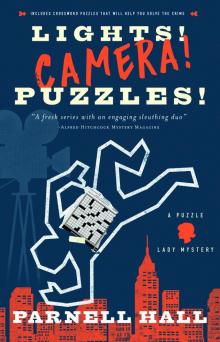 Lights! Camera! Puzzles!
Lights! Camera! Puzzles!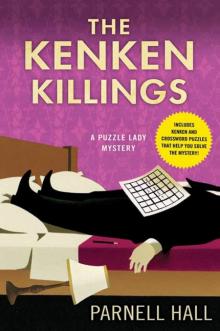 The KenKen Killings
The KenKen Killings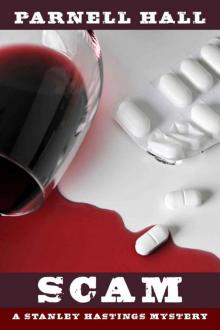 12-Scam
12-Scam The Puzzle Lady vs. the Sudoku Lady
The Puzzle Lady vs. the Sudoku Lady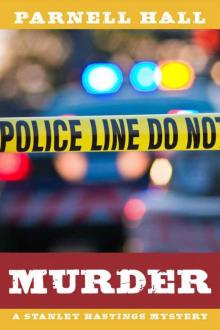 2 Murder
2 Murder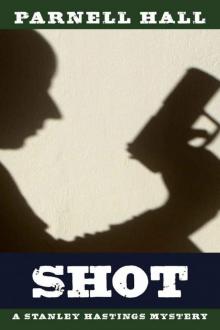 7 Shot
7 Shot You Have the Right to Remain Puzzled
You Have the Right to Remain Puzzled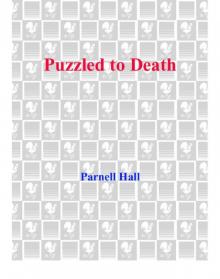 Puzzled to Death
Puzzled to Death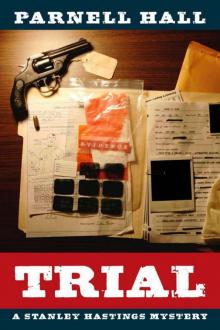 11-Trial
11-Trial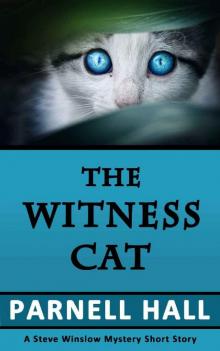 The Witness Cat (Steve Winslow Mystery)
The Witness Cat (Steve Winslow Mystery) With This Puzzle, I Thee Kill
With This Puzzle, I Thee Kill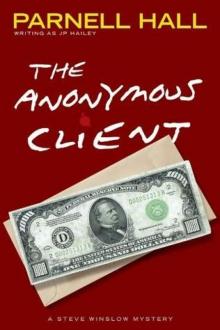 The Anonymous Client sw-2
The Anonymous Client sw-2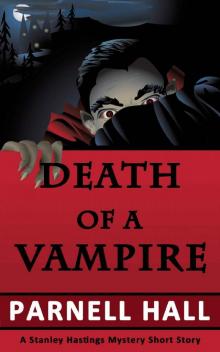 Death of a Vampire (Stanley Hastings Mystery, A Short Story)
Death of a Vampire (Stanley Hastings Mystery, A Short Story)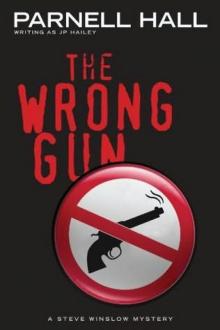 The Wrong Gun sw-5
The Wrong Gun sw-5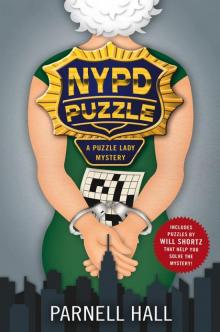 NYPD Puzzle
NYPD Puzzle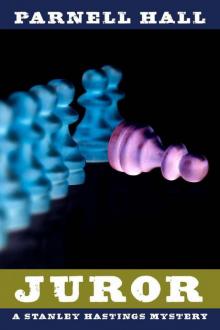 6 Juror
6 Juror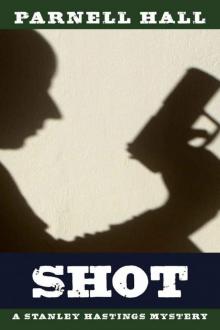 07-Shot
07-Shot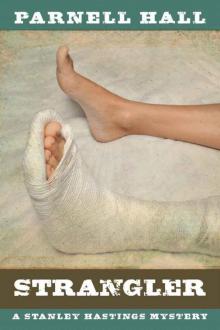 04-Strangler
04-Strangler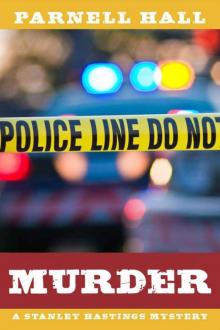 02-Murder
02-Murder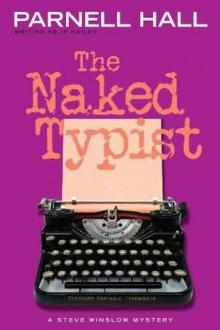 SW04 - The Naked Typist
SW04 - The Naked Typist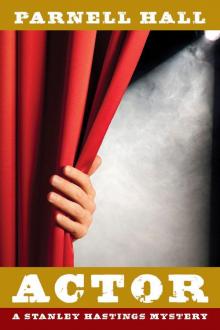 Actor
Actor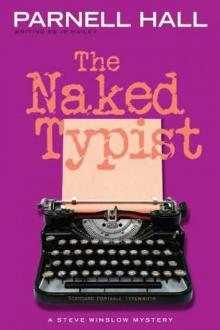 The Naked Typist sw-4
The Naked Typist sw-4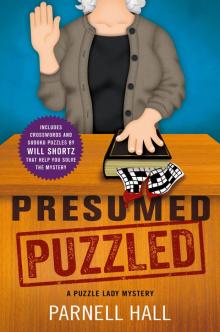 Presumed Puzzled
Presumed Puzzled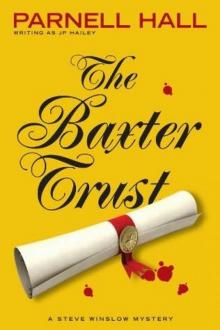 SW01 - The Baxter Trust
SW01 - The Baxter Trust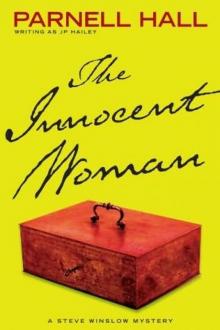 SW06 - The Innocent Woman
SW06 - The Innocent Woman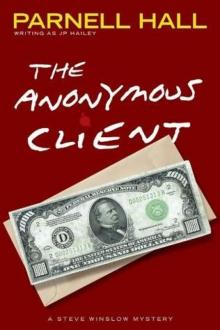 SW02 - The Anonymous Client
SW02 - The Anonymous Client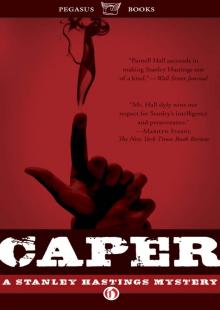 Caper
Caper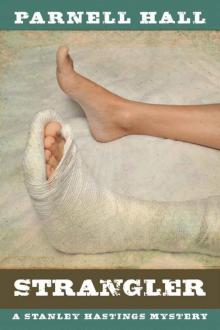 4 Strangler
4 Strangler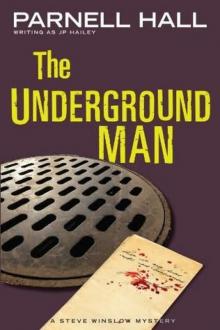 The Underground Man sw-3
The Underground Man sw-3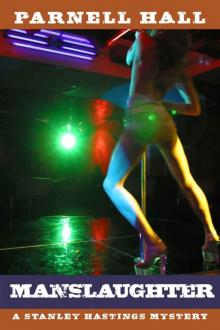 Manslaughter (Stanley Hastings Mystery, #15)
Manslaughter (Stanley Hastings Mystery, #15)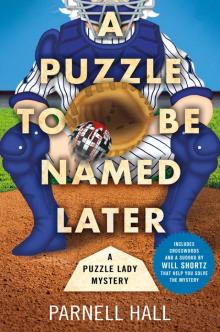 A Puzzle to Be Named Later--A Puzzle Lady Mystery
A Puzzle to Be Named Later--A Puzzle Lady Mystery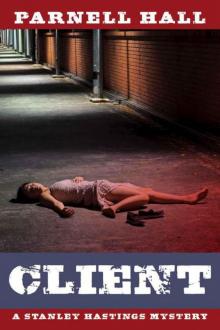 05-Client
05-Client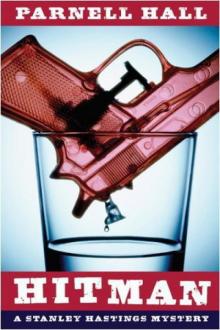 16 Hitman
16 Hitman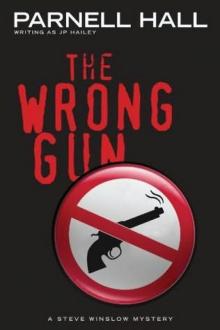 SW05 - The Wrong Gun
SW05 - The Wrong Gun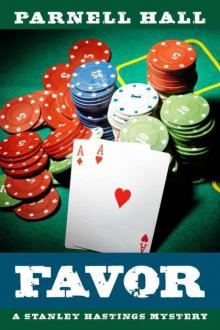 3 Favor
3 Favor Last Puzzle & Testament
Last Puzzle & Testament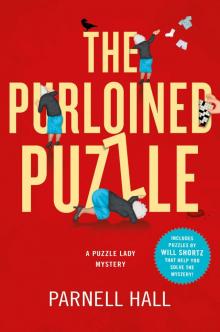 The Purloined Puzzle
The Purloined Puzzle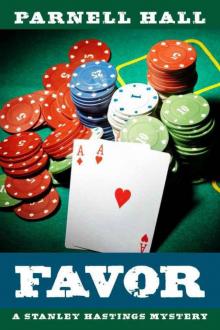 03-Favor
03-Favor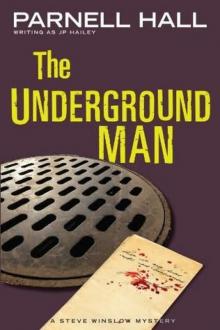 SW03 -The Underground Man
SW03 -The Underground Man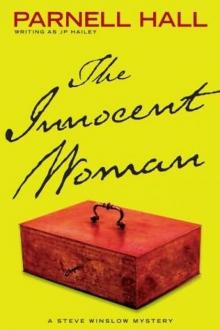 The Innocent Woman sw-6
The Innocent Woman sw-6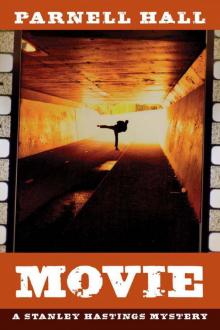 10 Movie
10 Movie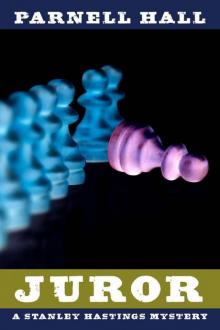 06-Juror
06-Juror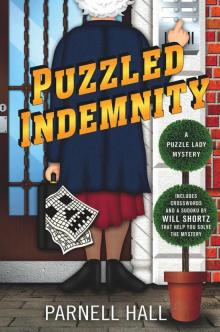 Puzzled Indemnity
Puzzled Indemnity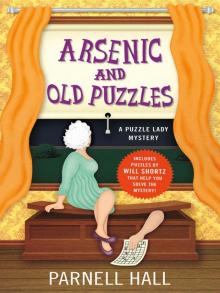 Arsenic and Old Puzzles
Arsenic and Old Puzzles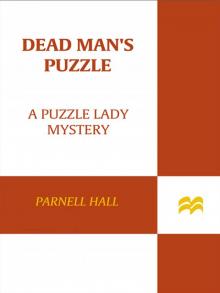 Dead Man's Puzzle
Dead Man's Puzzle Safari
Safari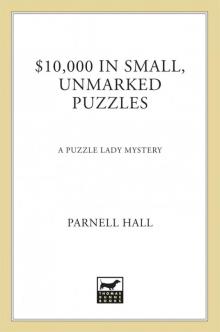 $10,000 in Small, Unmarked Puzzles
$10,000 in Small, Unmarked Puzzles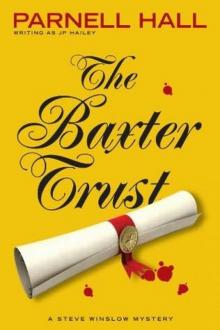 The Baxter Trust sw-1
The Baxter Trust sw-1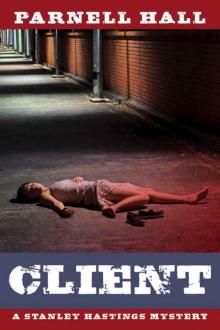 5 Client
5 Client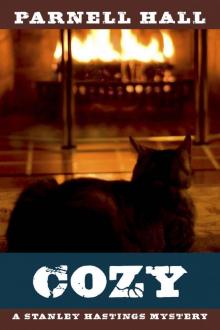 Cozy (Stanley Hastings Mystery, #14)
Cozy (Stanley Hastings Mystery, #14)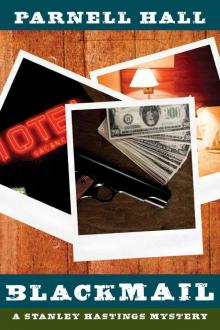 Blackmail
Blackmail A Puzzle in a Pear Tree
A Puzzle in a Pear Tree A Clue for the Puzzle Lady
A Clue for the Puzzle Lady Clicker Training (Stanley Hastings Mystery, A Short Story)
Clicker Training (Stanley Hastings Mystery, A Short Story)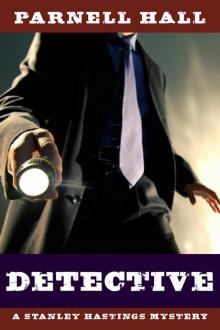 Detective (Stanley Hastings Mystery Book 1)
Detective (Stanley Hastings Mystery Book 1)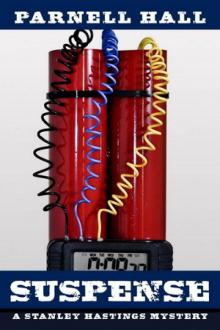 13 Suspense
13 Suspense